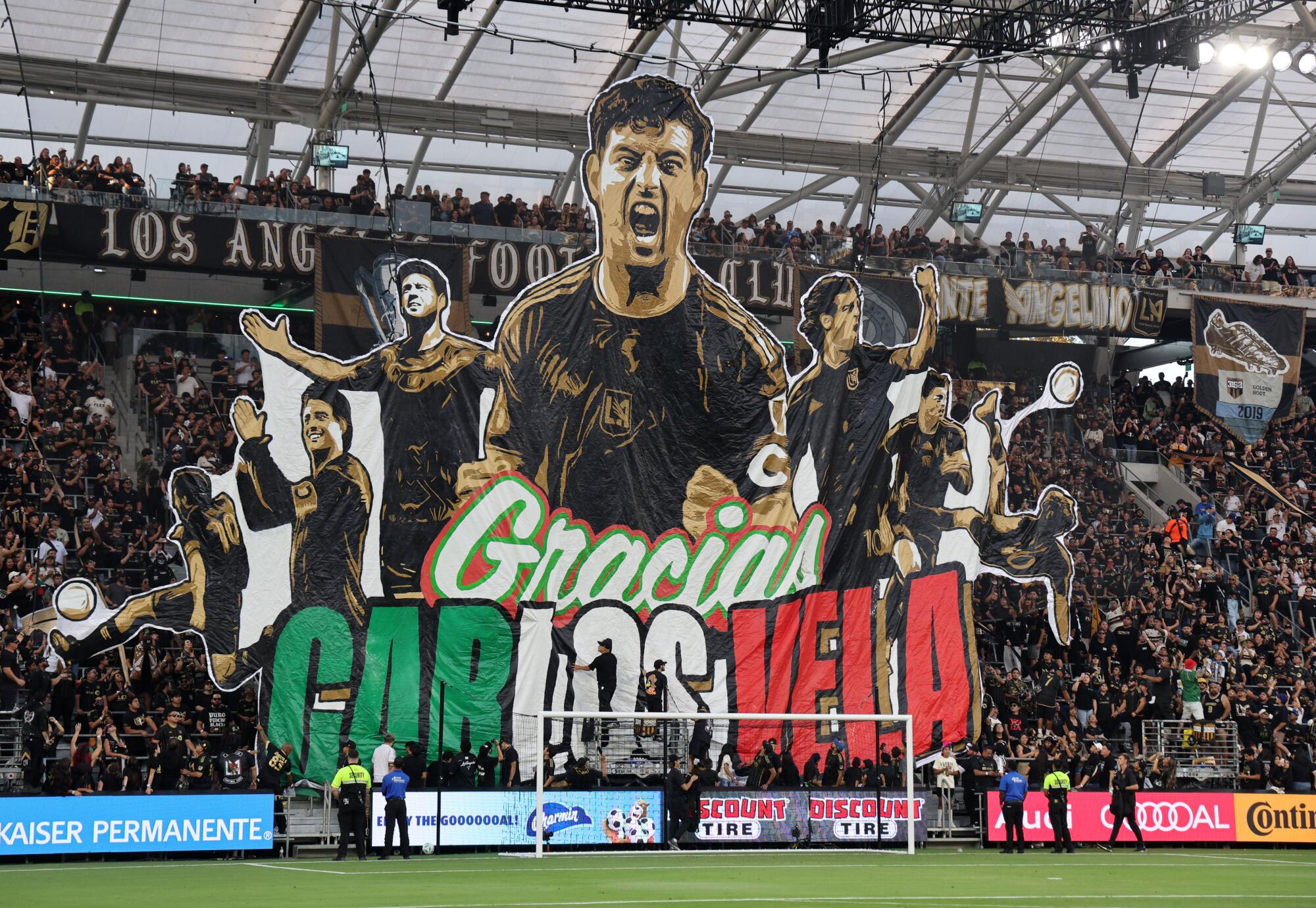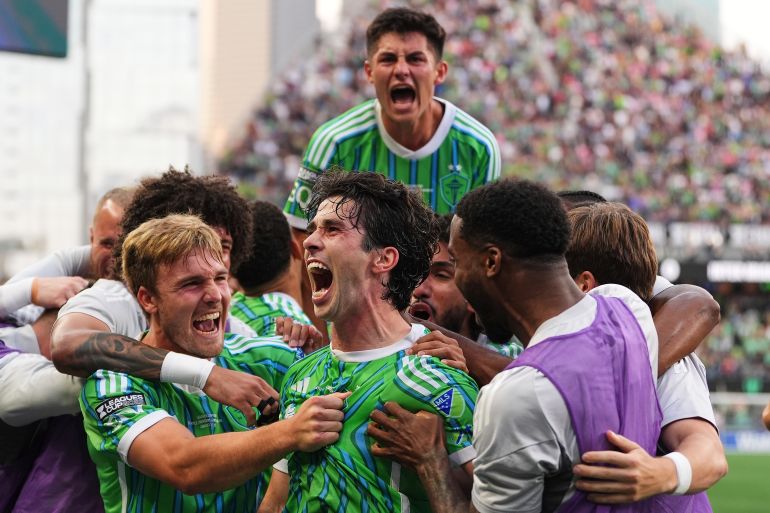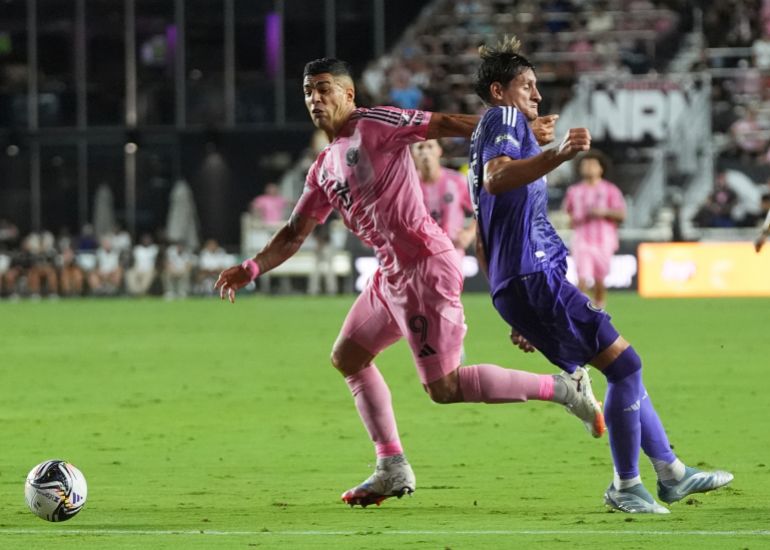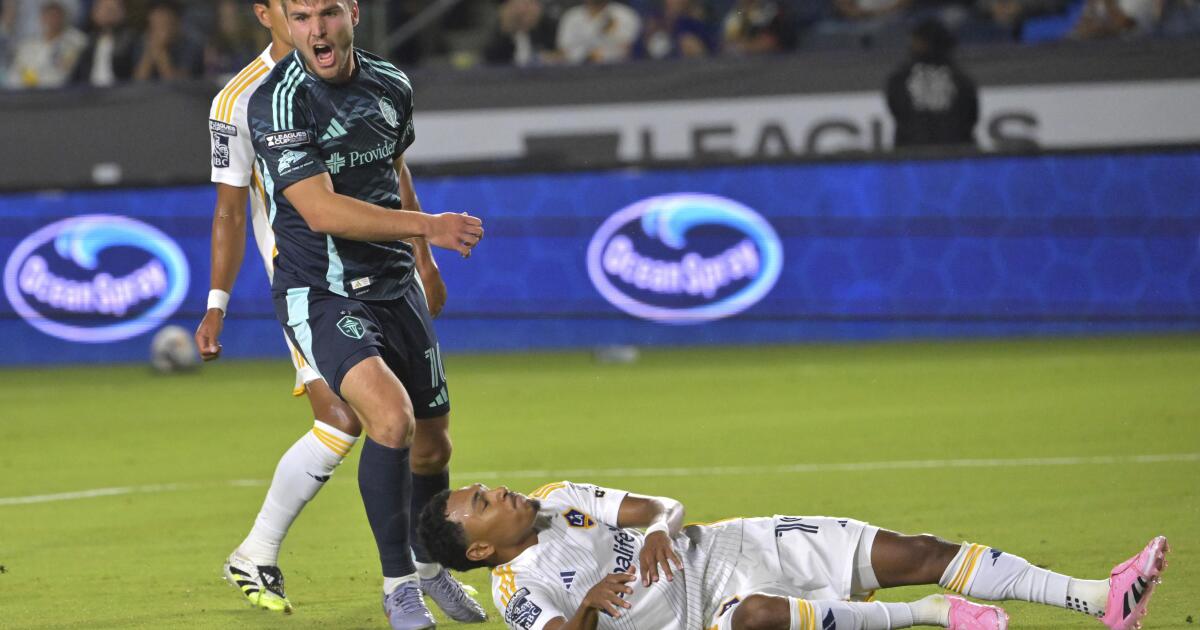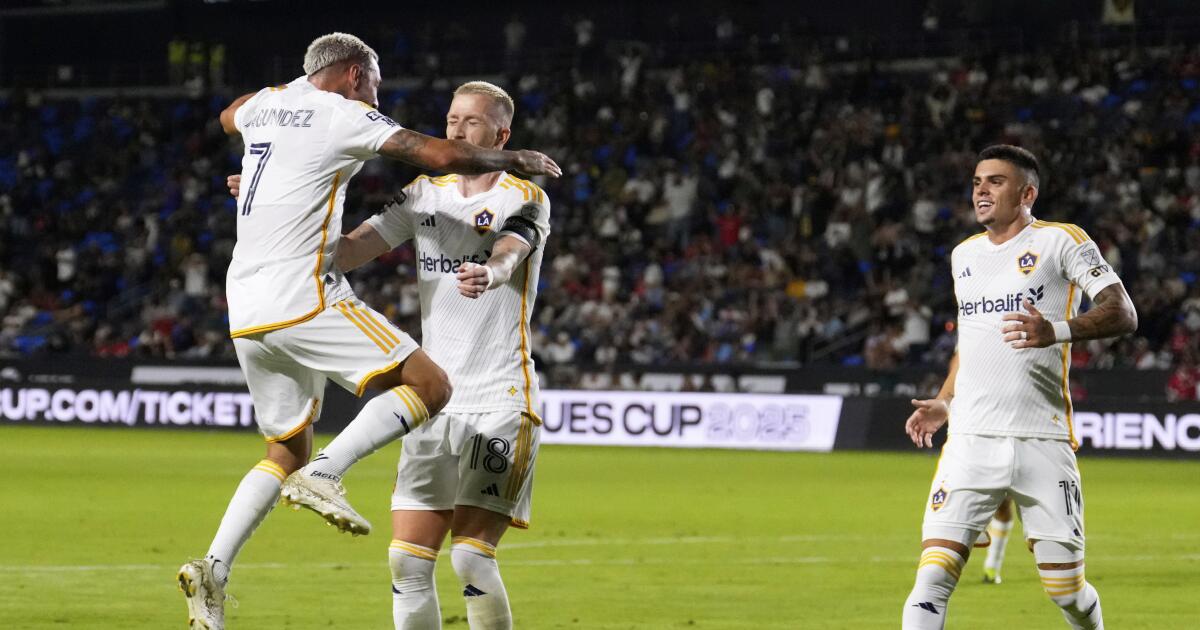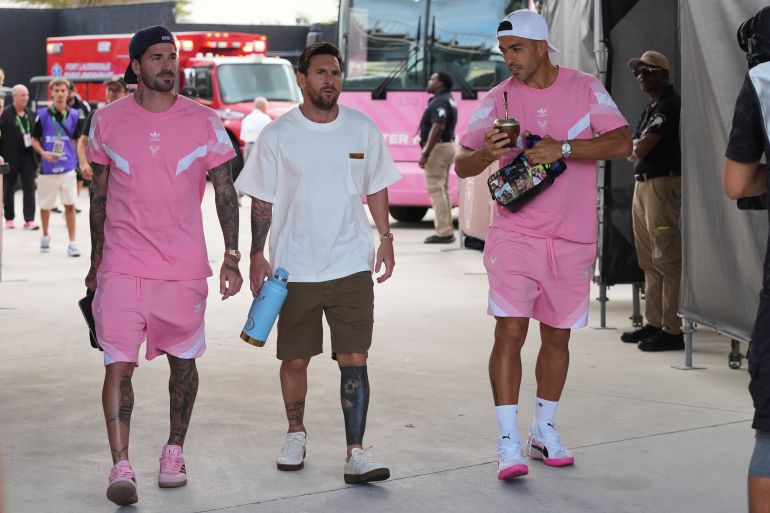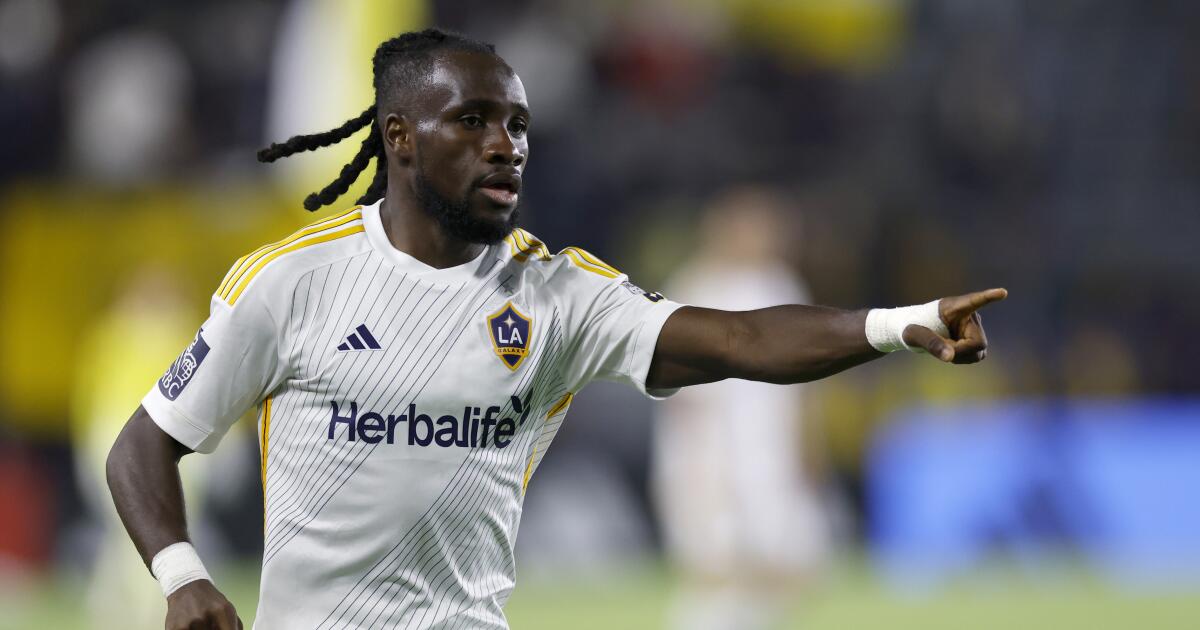Why the 2026 World Cup may not help American soccer leagues surge
Remember when soccer was being touted as the next big sport in the U.S.? Well, it looks like that moment has finally arrived.
Or not. It all depends on who you ask and how you interpret what they tell you.
On one hand, there’s the recent Harris Poll that found 72% of Americans profess an interest in soccer, a 17% increase from 2020. A quarter of those are “dedicated” fans and 1 in 5 say they are “obsessed” with the sport.
On the other hand, there’s the stark decline in attendance and TV viewership for the country’s top two domestic leagues, MLS and the NWSL, and the underwhelming crowds that showed up last summer for the FIFA Club World Cup and the CONCACAF Gold Cup.
LAFC fans lift up a banner honoring Carlos Vela during a ceremony to honor him before a match against Real Salt Lake at BMO Stadium on Sept. 21.
(Kevork Djansezian / Getty Images)
These contrary findings — a growing fanbase at the same time attendance and viewership numbers are falling off a cliff — come at an important inflection point for soccer in the U.S., with the largest, most ambitious World Cup kicking off at SoFi Stadium in fewer than 200 days.
“The short answer is yes, the World Cup will be a watershed moment for soccer in America. However, it’s unlikely to immediately lead to a significant increase in ticket sales for MLS and NWSL. Soccer fandom in America develops differently from that of other sports,” said Darin W. White, executive director of the Sports Industry Program and the Center for Sports Analytics at Samford University, which next year will launch a major five-year study to explore how soccer can become mainstream in the U.S.
“The World Cup will bring millions of new Americans into the pipeline. Over the next few years we expect these new fans to progress through the pipeline, giving soccer a substantial enough fan base to tip the scales and help make soccer part of the ongoing mainstream sports conversation. I am confident that the World Cup will enable soccer to reach that critical mass.”
Steven A. Bank, a professor of business law at UCLA who has written and lectured extensively on the economics of soccer, isn’t as optimistic.
“The risk isn’t that U.S. soccer will be in the same place in 10 years, but that it will have regressed,” he said.
“For the World Cup to benefit domestic leagues’ attendance, ratings, and revenue, as well as youth and adult participation rates in playing soccer, it will have to be the catalyst for more domestic investment in the game. The question isn’t whether the World Cup will convince enough people to become fans or to move from casual to dedicated or obsessive fans. It’s whether it will convince enough wealthy people and companies to risk the kind of money necessary to compete with the top leagues for the top talent.”
U.S. captain Christian Pulisic drives the ball during an international friendly against Ecuador at Q2 Stadium on Oct. 10 in Austin, Texas.
(Omar Vega / Getty Images)
That investment could be a boost to both first-tier domestic leagues, which saw their attendance and TV rating fall dramatically this year. After setting records in both 2023 and ‘24, MLS watched its average attendance fall 5.4% — to 21,988 fans per match — this season. According to Soccer America, 19 of the 29 teams that played in 2024 saw their attendance drop; more than half saw declines of 10% or more.
The TV audience also appears to be relatively small, although the fact Apple TV, the league’s main broadcast partner, rarely releases viewer data has hampered efforts to draw any firm conclusions. MLS said last month that its games attracted 3.7 million global aggregate viewers a week on all its streaming and linear platforms, an average of about 246,000 a game on a full weekend. While that’s up nearly 29% from last year, the average viewership figure is about 100,000 smaller than what the league drew for single games on ESPN alone in 2022, the last season before Apple’s 10-year $2.5-billion took effect.
NWSL also saw overall league attendance fall more than 5%, with eight of the 13 teams that played in 2024 experiencing declines. And TV viewership in the second year of the league’s four-season $240 million broadcast deal was down 8% before the midseason July break, according to the Sports Business Journal.
That follows a summer in which both the expanded Club World Cup and the Gold Cup struggled to find an audience. Although the 63-match Club World Cup drew an average of 39,547 fans per game, 14 matches had crowds of fewer than 20,000. The Gold Cup averaged 25,129 for its 31 games — a drop of more than 7,000 from 2023. And five matches drew less than 7,800 people.
“There’s a danger of taking this year’s decline out of context,” said Stefan Szymanski, a professor of sports management at the University of Michigan and author of several books on soccer including “Money and Soccer” and “Soccernomics” (with Simon Kuper). “Last year was a record year. It’s really about the diminishment of the Messi effect.
“I wouldn’t say it’s a moment of crisis. And the way MLS is looking at this strikes me that they’re entirely focused on a post-World Cup [bump], which they think they’re going to get. I’d be skeptical myself about that. I don’t think it will do that much for them.”
Szymanski said the World Cup could hurt the league by underscoring the huge difference in the quality of play between elite international soccer and MLS.
“Americans are not dumb,” he said. “They know what’s good quality sport [and] not good quality sport. And they know that MLS is low level. The only way, in a global marketplace, you can get the top talent to have a truly competitive league is to pay the salaries.”
Which brings us back to Bank’s conclusion that fixing soccer in the U.S. isn’t about the soccer, it’s about the money being spent on the sport. For next summer’s World Cup to have a lasting impact, the “bump” will have to come not just from an increase in attendance and TV viewership but in investment as well. And, as Szymanski argues, that means additional investment in players as well.
“If all it does is attract eyeballs for this competition,” Bank said “I’m not sure it does more than the Olympics does every four years when it temporarily raises the profile of a few sports for some people who were not casual fans before.”
